«Я люблю смотреть, как умирают дети» в контексте цикла Маяковского «Я»
"I love to watch children dying" in the context of Mayakovsky's poetic cycle "I"
Author(s): Maria Aleksandrova, Leonid Bol'shuchinSubject(s): Literary Texts
Published by: Česká asociace slavistů
Keywords: Mayakovsky; poetic cycle "I"; russian poetry;
Summary/Abstract: In traditional interpretations Mayakovsky's notorious line "I love to watch children dying" is referred to as the lyric subject's "blasphemy", "shocking behaviour", and "irony". A new approach to the problem of the subject of the poetic utterance results from the contemplation over the poetic model of the world shaped by Mayakovsky in his first book "I". The fact that this model is based on the mythologem of stem and kinship determines the multiplicity of characters, polyphony of voices, and the drama-like arrangement of the poetic material. The chain of characters with whom the lyric subject dialogises (the wife-moon, the daughter-song, the mother) is concluded by the image of the father in the culmination poem of the poetic cycle. This adressee should possess the ideal unity of humaneness, affinity, and authority, but at the same time it is he who makes the lyric subject suffer. The suffering "I" turns out to be a child to the father, while the one who is watching children dying ("I love to watch...") corresponds with the heavenly torturer. In the same poem the complexity of the lyric subject's position is revealed: the protagonist takes the place of the Christ and, at the same time, starts a theomachic dialogue with the supreme force. His word and action are full of tragic gravity. It's in the dialogue with the father that the problem of the son's self-determination reaches its ultimate death-defying peak. Thus, the problem of the "scandalous" line appears to be just one side of a much more generic issue, which is the problem of the subject-object organisation of Mayakovsky's poetic world.
Journal: Новая русистика
- Issue Year: 2009
- Issue No: 2
- Page Range: 79-91
- Page Count: 13
- Language: Russian

